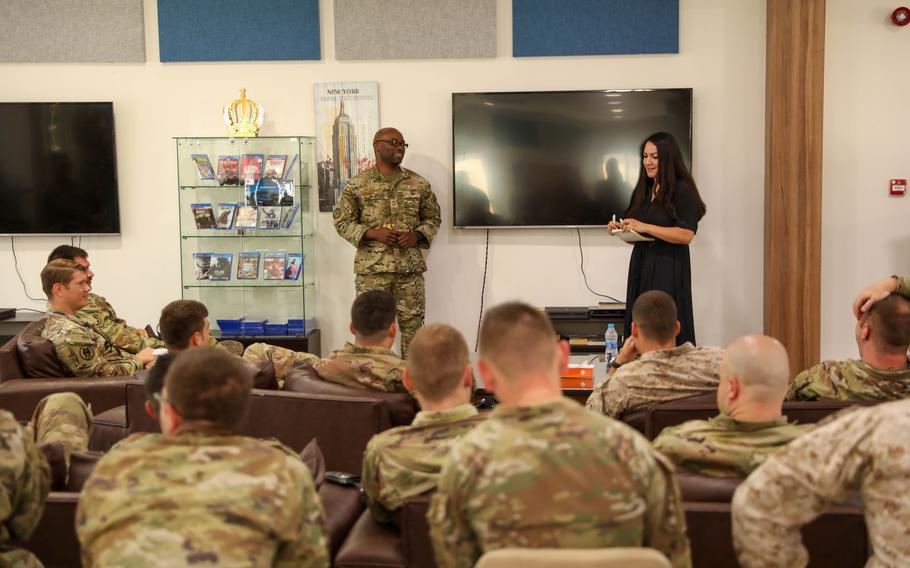
Air Force Chief Master Sgt. Brian Holmes and Lucy De La Mora, center manager for the USO, answer questions from troops in Jordan in September 2023 about junior enlisted services. (Demond Dean/Combined Special Operations Joint Task Force )
Junior enlisted troops will get $20 added to their paychecks for the next six months through a congressionally authorized pot of money intended to help fight the rising cost of living for the lowest paid in the military.
Congress provided $43 million to the Defense Department for this purpose and required the money go to troops below E-6 ranks and the funds be spent before the end of the year. The monthly payments were included in the fiscal 2024 National Defense Authorization Act, an annual bill that outlines priorities and spending for the military. The funds were not actually released to the Pentagon until March, when the defense appropriations bill passed.
To make certain the most junior troops benefitted from the limited funds, officials chose to issue monthly payments to those in the lowest three ranks of each military service, said Joshua Wick, a Defense Department spokesman.
Beginning this month, roughly 266,000 eligible troops will get $120 spread out over six months, he said. The last payment will hit bank accounts in December.
However, at that amount, roughly $9 million should still be available of the $43 million approved by Congress. Officials did not say what will happen to the remaining money.
“While every bit helps, $20 per month is simply not enough,” said Shannon Razsadin, CEO of Military Family Advisory Network, a nonprofit that advocates for military families.
A survey released last month by the nonprofit found more than 60% of enlisted families reported low financial well-being, including a family’s ability to pay for basic needs comfortably, have savings for unexpected costs and to be employed at the level of choice. The nonprofit called on the Pentagon to reevaluate compensation for all troops to alleviate the challenges that some junior service members face in providing basic needs for their families. Persistent challenges such as not having enough food and the increased cost of housing are exacerbated by being in the military, which includes frequent moves or living in an area with a high cost of living, according to the report.
“The pay and compensation package must ensure that service members can — at a minimum — meet their basic needs, and the data around food insecurity shows that we have work to do,” Razsadin said.
Every four years, the military conducts a review of compensation, and Razsadin said she is optimistic this will offer more complete solutions to support more enlisted service members. The last review was released in 2020.
Rep. Don Bacon, R-Neb., a retired Air Force brigadier general and a member of the House Armed Services Committee, said this issue of economic hardship is precisely why he was asked last year to organize and lead the Military Quality of Life panel in the House.
“No reasonable person can conclude that military pay and compensation, housing, health care, etc., is meeting the needs of military service members and families in the current economy. To conclude otherwise shows either willful ignorance or outright neglect,” he said in a statement.
The House proposed a 20% pay raise for junior enlisted troops in its draft defense authorization bill for fiscal 2025 but it was rejected last month by the White House. The pay increase was a key part of House efforts to improve quality of life for service members.
The White House said it opposed making such a significant change before the quadrennial review of military pay is complete.
“It occurs to me that if we don’t summon the will to take these issues seriously, the commander in chief may not have an all-volunteer force to command in a few years,” Bacon said. “Congress will have the last word and I look forward to discussions with my Senate colleagues once they finish consideration and pass their NDAA so we can begin conference negotiations.”